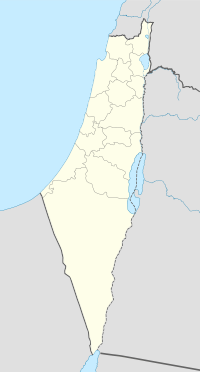Karatiyya
| Karatiyya | |
|---|---|
| Arabic | كرتيا |
| Name meaning | "Thick, tangled grass" (possibly) |
| Also spelled | Karatayya, Karatiya, Qaratiyya |
| Subdistrict | Gaza |
| Coordinates | 31°38′37″N 34°43′33″E / 31.64361°N 34.72583°ECoordinates: 31°38′37″N 34°43′33″E / 31.64361°N 34.72583°E |
| Palestine grid | 124/116 |
| Population | 1,370 (1945) |
| Area | 13,709 dunams 13.7 km² |
| Date of depopulation | 17-18 July 1948 |
| Cause(s) of depopulation | Military assault by Yishuv forces |
| Current localities | Komemiyut,Rewacha,Nehora |
Karatiyya (Arabic: كرتيا) was a Palestinian Arab village of 1,370, located 29 kilometers (18 mi) northeast of Gaza, situated in a flat area with an elevation of 100 meters (330 ft) along the coastal plain of Palestine and crossed by Wadi al-Mufrid.
Byzantine ceramics have been found here.
In the 12th century, a castle called Galatie was built on the village site by the Crusaders, it was subsequently captured by the Ayyubids under Saladin in 1187, and destroyed September 1191.
The place called Kulat el Fenish by the village was apparently once a church. The remains were seen in 1875: "The tower on the mound is called Kulat el Fenish. It is a solid block of masonry, standing some 20 or 30 feet in height. Near it lie shafts and bases of white marble, and an elaborate cornice, well and deeply cut. There is also a font, like that at Beit 'Auwa (Sheet XXI.), formed by four intersecting circles, and measuring 37 feet along the diameter, and 2 feet high."
In 1226, Arab geographer Yaqut al-Hamawi writes of the village under Ayyubid rule as "Karatayya" as "a town near Bait Jibrin, in the Province of Filastin. It belongs to Jerusalem."
The Mamluk sultan al-Nasir ibn Qalawun camped in Karatayya in 1299 on his way to fight the Mongols. 14th-century Arab geographer Al-Dimashqi reports that at times it was a part of Mamlakat Ghazzah ("Kingdom of Gaza").
...
Wikipedia

